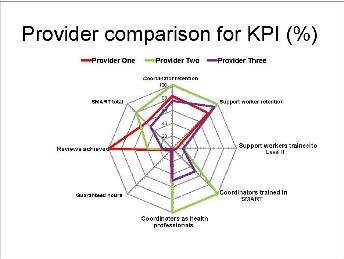
Stephen Jacobs
University of Auckland, New Zealand
Title: A systematic method for improving service quality in home support services for older people
Biography
Biography: Stephen Jacobs
Abstract
Health services are seeking to assist older people to stay functional and at home for as long as possible. However, community care for elderly with complex health needs raises issues about co-ordination, risk aversion and societal expectations of safety. Safety is less important to older people than a sense of control. New Zealand research uncovered older people were dissatisfied with home based services. They thought they were insufficiently involved in decision-making, cultural differences were insufficiently respected, and they had little control over their everyday lives a balanced scorecard was established to enable benchmarking of success factors critical to the successful support of older people living in the community. Benchmarking can assist learning by ‘communities of practice’ by identifying what works well. A recursive innovation, action research approach involving twenty focus groups across three District Health Boards informed the initial implementation of the INTOUCH benchmarking system with five District Health Boards. Data from performance measurement is used to triangulate the personal and social worlds of the stakeholders. Transparency helps quality improvement. The recursive dialogue encouraged by INTOUCH supports better and more sustainable service development because performance management is anchored to agreed data that has meaning to all stakeholders. Incorporating the consumer perspective within the balanced scorecard means older people are included in the service design and delivery. Implementation fidelity is a major issue in contemporary health projects so an evidence-based systematic model that engages all stakeholders into an agreed approach provides leaders with a management control mechanism that is useable in this twenty-first century world in which people work in networks and alliances.

Recent Publications:
- Jacobs SP, Rouse P, Parsons M (2014) Leading change within health services: The theory behind a systematic process for leading the implementation of new services within a network structure. Leadership in Health Services 27,2:72-86
- Senior HE, Parsons M. Kerse N, Chen M, Jacobs S, Vanderhoorn, S, Anderson C. (2014) Promoting independence in frail older people: a randomised controlled trial of a restorative care service in New Zealand. Age & Ageing 43: 418–424
- Parsons, M, Anderson C, Senior H, Chen X, Kerse N, Jorgensen D, Brown p, Jacobs S, Vanderhoorn S, Kilpatrick J. (2005) ASPIRE - Assessment of Services Promoting Independence and Recovery in Elders. Auckland: The University of Auckland.
- Sajtos, L., Rouse, P., Harrison, J., & Parsons, M. (2014). Case-mix system as a boundary object: the case of home care services. Australasian Marketing Journal (AMJ), 22 (3), 189-196.
- Breitenstein, S.M., Gross, D., Garvey, C.A., Hill, C., Fogg, L. and Resnick, B. (2010) Implementation fidelity in community-based interventions, Research in Nursing and Health, 33, 164-173.


